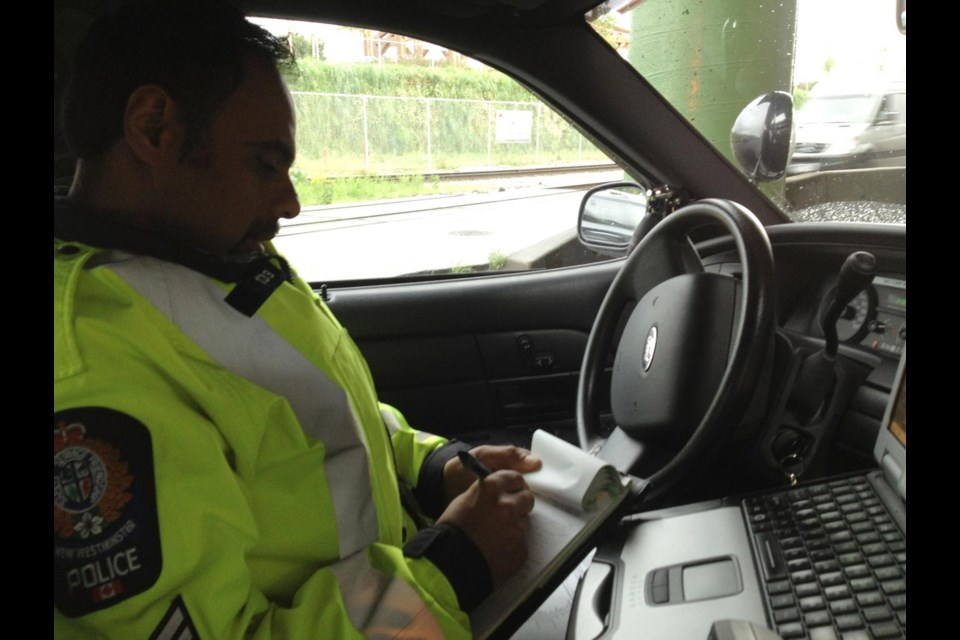Just as wearing seatbelts wasn’t always the norm in society, the idea that texting or talking on your phone is a dangerous activity to do while driving still isn’t getting through to some drivers.
During the month of September, ICBC ran a campaign targeting distracted driving. Along with radio and TV ads, the insurance corporation partnered with police departments across the province to conduct a mass crack down on the potentially deadly habit. The final numbers for New Westminster haven’t come in yet, but the police department did its best to ticket anyone caught using a phone while driving, according to Sgt. Terry Dhut.
The Record recently tagged along with Dhut, one of four members in the department’s traffic service unit, as he drove around the city looking for people using their phones while driving.
It was just past 3 p.m. on a busy Wednesday afternoon when Dhut pulled on to Sixth Street. Cars bound for the Pattullo Bridge were already starting to line up along Royal Avenue.
Dhut circled the area, waiting for his partner, Const. Jaspaul Chung, to get into position between Sixth and Seventh on Royal Avenue. When he got the OK from Chung, Dhut pulled his police cruiser into the small, yellow-lined section of road eastbound at Royal Avenue and Sixth Street.
There, he parked and waited for Chung. He didn’t have to wait long, within five minutes Chung was sending him their first offender. Dhut flagged down the driver of a white Toyota Tacoma. The driver pulled over to the left, in front of the police cruiser and Dhut jumped out to speak with the man.
Dhut explained to the driver why he had been pulled over and how he could dispute the charge, if he wanted to, but he didn’t. He admitted he was on the phone, Dhut said
That’s typical, Dhut added, it’s hard to argue when you’re caught red-handed, so to speak.
“Some people just don’t realize how dangerous it is. It’s just like impaired driving,” he said.
To catch the distracted drivers, the two officers used a method called “splitting the lane” where one officer, in this case Chung, walks down a lane of traffic while drivers are sitting at a light, and looks for people using their phones – yes, Dhut said, using your phone while stopped at a light still counts as distracted driving and it still means a $167 ticket.
Chung then sends the drivers he spots over to Dhut, who writes up the tickets.
In 45 minutes, Dhut and Chung pulled over three more drivers. One driver was texting while driving and another, from Colorado, was using their smartphone map. When Dhut asked the visitors if Colorado had a similar law against distracted driving, they admitted it did.
“Even visitors aren’t exempt,” Dhut said. “You should know the law of land.”
While most drivers admitted they were using their phones, the fourth driver they pulled over did not.
When Dhut went up to speak with the driver of a white Ford Expedition, the driver said he was just ending a call, but he quickly denied actually ever using his phone, Dhut said.
“He (the driver) just told me he’d see me in court,” Dhut said.
After an hour on Royal Avenue, Dhut and Chung decided to change their strategy and position. They headed over to Brunette Avenue and parked themselves in an abandoned lot facing traffic.
“It’s not about stealth or getting as many tickets as we can, it’s about just getting out there,” Dhut said as he pulled his marked police car into the open yard. “You can be parked on the sidewalk and people who are paying attention will see you and people who are talking on their cellphones won’t. That’s why they’re distracted.”
This was especially evident as Dhut and Chung worked the Brunette location.
The second driver they spotted was stopped in traffic talking on his cellphone, about 50 feet from the two police cruisers. As Chung crept out into traffic, closing the gap between the offender and himself, the driver was too distracted to even notice what was happening. It wasn’t until Chung activated his siren that the driver looked over and came face to face with the officer.
“This is what it’s all about,” Dhut said. “It’s about getting the message out that (using your cellphone is) dangerous.”
Prior to the distracted driving law, most people, including Dhut, didn’t think that using a cellphone while driving was dangerous, but the new law has led police departments to identify new cause of car accidents.
Today, traffic accident investigators will look at cellphone records if there is evidence at the scene that indicates distracted driving may be the cause, Dhut added.
“It wasn’t even a thought before, but looking back, you realize it was a safety (hazard),” Dhut said. “Without the law, (the thought) doesn’t exist.”
www.twitter.com/cayleydobiehttp://www.twitter.com/cayleydobie



